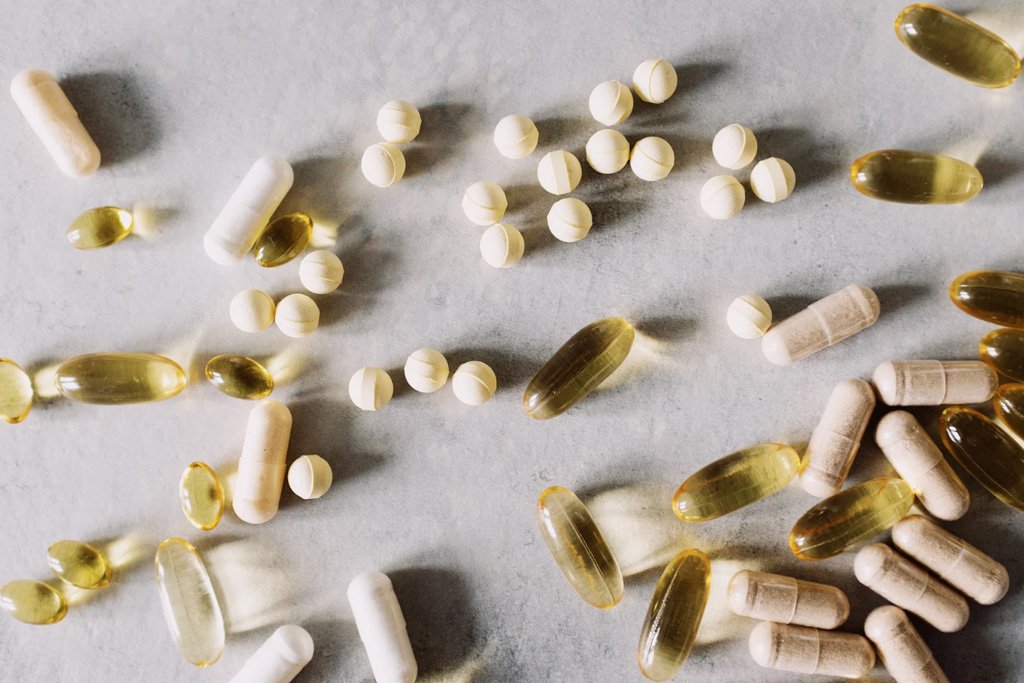
Many people in the UK take one or more daily dietary supplements. Data from a 2021 survey commissioned by the Health Food Manufacturers’ Association (HFMA) shows that over 71% of adults support their health and wellbeing using various vitamins, minerals, amino acids, enzymes, probiotics, and other beneficial ingredients such as herbs. These supplements are available in a variety of forms, including oral supplements: tablets, capsules, gummies and sprays, or intravenous (IV) drips and intramuscular (IM) injections. Some methods of delivery are more effective than others of course, but oral supplements are the most accessible and commonly used.
The same survey reveals that among new users of nutritional supplements, Vitamin D topped the list of ‘most common dietary addition’ at 63%, followed by Vitamin C (ascorbic acid) at 39%. Other popular micronutrient supplements are Vitamin B12, minerals such as iron and zinc, various amino acids, glutathione, and coenzyme Q10 (CoQ10). 61% of users cited their reason for supplementing as for ‘general health and wellbeing’, with 24% claiming it was for vitamin deficiency. Additional reasons include joint health, health optimisation, and immune system support.
With more and more people choosing to supplement their diets and a larger range of health products on the market – particularly as a result of the COVID-19 pandemic – it’s of even greater importance that you do your research and choose to purchase good quality vitamins and minerals to consume. Here are a few things you should be aware about when it comes to your oral supplements:
High Salt and Sugar Content
It really doesn’t help to have large amounts of salt and sugar in oral supplements that are meant to be good for our health. Some fizzy Vitamin C tablets contain more than 1000mg of salt each – that’s 17% of the daily recommended amount for adults! Excessive sodium intake increases risk of high blood pressure, heart disease and stroke. Sugar is most commonly added to supplements such as chewable vitamins and gummies in the form of glucose syrup, sucrose and dextrose to mask their otherwise unpleasant and bitter taste.
Too Much Filler
Many manufacturers use talcum powder as a filler to bulk up their oral supplements, meaning the majority of their capsules and tablets contain content that is of no actual nutritional use to your body. The ingredient is often hidden behind its chemical name, magnesium silicate – which, to the untrained eye, seems like just another useful dietary mineral. In fact, low-quality talc can even contain carcinogenic asbestos. Veins of asbestos can often be found in underground talc deposits, so there is a risk of cross-contamination, geologists say.
Inactive Vitamin Forms
Not all forms of vitamins are equal. Some are easy for your body to absorb effectively, while others aren’t. The better you can absorb a nutrient, the more effective it will be within your body. Unfortunately, less effective forms of vitamins and minerals are generally cheaper to manufacture: thus they easily find their way into many supplements on the market. A prime example of this is cyanocobalamin, an inactive form of Vitamin B12. Active forms of Vitamin B12 include methylcobalamin and adenosylcobalamin.
Artificial Colourings
Titanium dioxide is used to give tablets and the contents of capsules a clean, white colour, suggesting the faux ‘purity’ of oral supplements. The European Commission actually banned the use of titanium dioxide as a food additive earlier this year – due to health concerns regarding its carcinogenic potential. Although it’s still legal in the UK, that doesn’t mean you should be comfortable consuming it.
Poor Bioavailability
Bioavailability is the proportion of a nutrient that is digested, absorbed and metabolised through normal pathways. Bioavailability varies greatly, and is affected by individual factors such as age, sex, digestive issues, medications, certain health conditions and more. Oral supplements have significantly poorer bioavailability compared to intravenous (IV) and intramuscular (IM) supplements, which are administered via infusion and injection. IV Drips and IM Booster Shot Injections are 100% bioavailable, since they are delivered directly into the bloodstream.
Potential Health Interactions
It’s way too easy to overdo it with oral supplements, especially with how easy they are to purchase in any pharmacy, supermarket or health food shop. Whether it’s taking too much in one go or taking them more frequently than you should, many people are guilty of not following the recommended dosage instructions, which could lead to negative side effects. Supplements may interact with other medications you’re taking, pose health risks if you have certain medical conditions, and produce adverse effects if you have recently had (or are due for) surgery. Be sure to talk to a medical professional about your medical history, concerns and goals before choosing to supplement. Get A Drip offers a free consultation service with our medical staff for this reason.
To Conclude…
In summary, oral nutritional supplements can bring about health benefits: providing they are of good quality and used appropriately according to your individual needs. We strongly recommend that you do your research about the oral supplements you take, and perhaps consider alternative methods of supplementation such as IV Drips and Booster Shot Injections. Don’t be afraid to ask questions if you are unsure of what exactly is on the labels of your vitamin and mineral bottles, and talk to a health professional for additional guidance.


